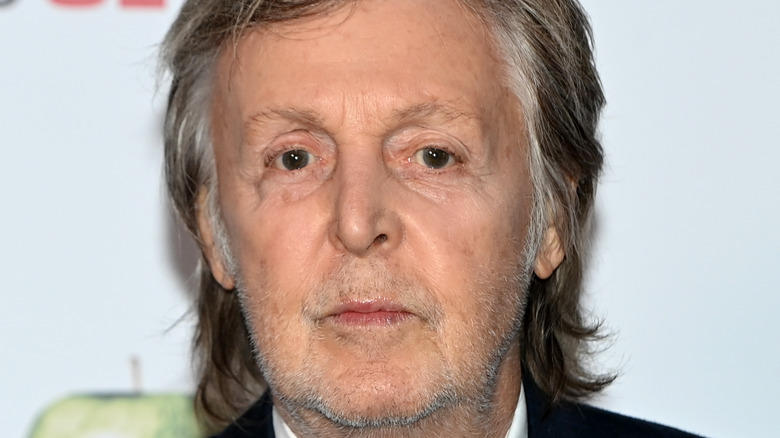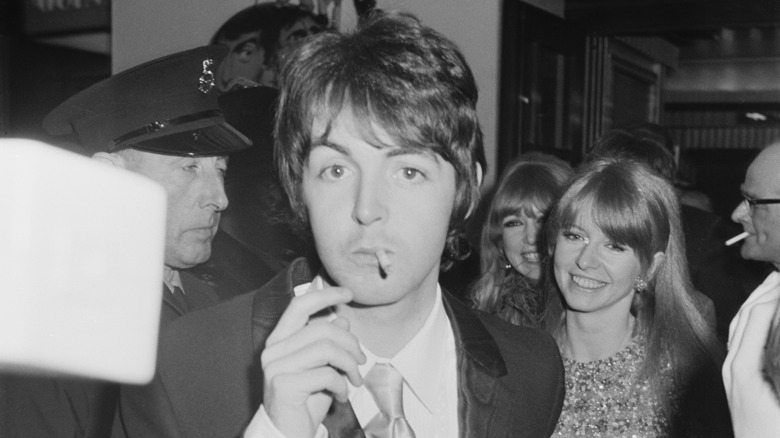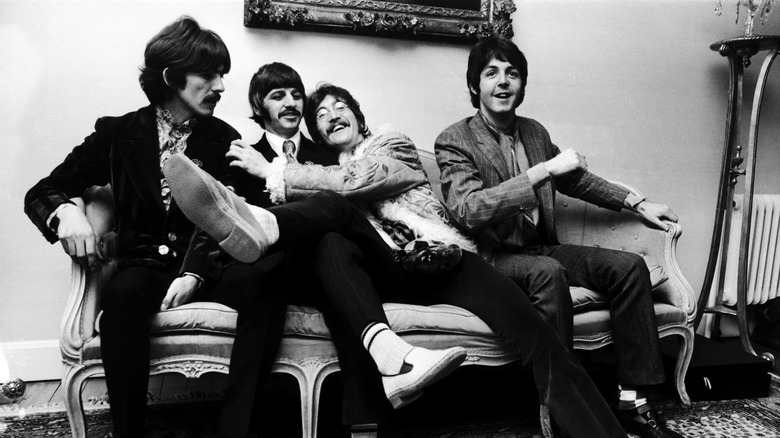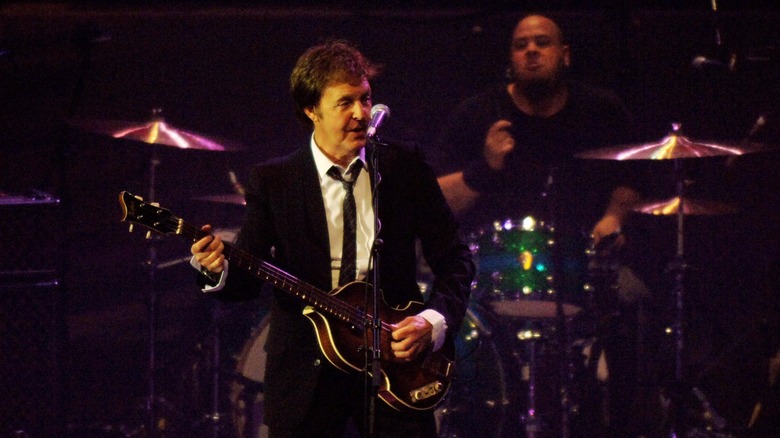The Truth About The Song Paul McCartney Couldn't Release
There are many assumptions fans typically make when it comes to The Beatles. That Yoko was responsible for their break-up. That Ringo wasn't actually a very good drummer. That they all got deep into spirituality.
But the biggest when it comes to the actual music is that John Lennon was the weird, artsy one, while Paul McCartney stuck to the more traditional side of songwriting. Much of this stereotype comes from reports of how tensions began to emerge in The Beatles' later years together: that Lennon, often frustrated with his own songwriting partner, dismissed many of the songs McCartney had written for 1967's "The Beatles" — aka "The White Album" — such as the saccharine "Oh-Bla-Di, Oh-Bla-Da" as "granny s***," according to Ultimate Classic Rock. Meanwhile, Lennon himself was delivering cutting-edge experimental tracks, such as the infamous sound collage "Revolution No. 9."
But in reality, McCartney was embracing experimentalism as much as any of the other Beatles. In 1965, McCartney created a special Christmas present for his bandmates: a special recording called "Unforgettable," pressed exclusively onto three acetates, which Rolling Stone describes as an "experimental private mixtape." The piece was composed using a number of tape loop machines, which McCartney had taken to experimenting with under the influence of avant-garde composer Karlheinz Stockhausen. When the band then convened to begin work on "Revolver," McCartney's use of tape loops underpinned "Tomorrow Never Knows," the album's experimental finale.
And along with the bizarre mixtapes and mashups McCartney was experimenting with in the mid-60s, there was rumored to be another, more ambitious project: "Carnival of Light." It was perhaps the weirdest, and most seldom heard, Beatles song ever recorded.
'Carnival of Light': Myth or Legend?
You would think that over the course of 50 years every available piece of Beatles material would have been released to the public, especially considering the huge demand the band still enjoys from listeners around the world. For years, however, rumors abound that despite numerous projects such as the Anthology series of double albums from the 1990s — which offered listeners many unreleased demos and outtakes for the first time — there was still one Beatles song that remained a mystery: a bizarre composition titled "Carnival of Light."
The first official acknowledgment of the song's existence came in 1988, according to Beatles Bible, with greater context and details of its composition emerging 1997, with the release of Barry Miles' biography of McCartney, "Many Years From Now." Miles tracks McCartney's long association with the growing avant-garde movement of the mid-60s, and claims that McCartney was asked to supply a piece of music for an organized rave at the London Roundhouse theater by an artist named David Vaughn, after Vaughn had delivered McCartney a new piano decorated with a hand-painted psychedelic design. To the surprise of both Vaughn and Miles, McCartney, who was already a star at this point, agreed, and within days Vaughn received a tape of new material from the famed songwriter.
Per the BBC, McCartney confirmed the existence of "Carnival of Light," a 14-minute composition, in 2007. And to the surprise of countless fans, McCartney revealed that he still owns the master tapes, according to Wired.
The composition of 'Carnival of Light'
According to Barry Miles, "Carnival of Light" came about in January 1967, during the sessions for "Sgt. Pepper's Lonely Hearts Club Band," one of the group's most creative and innovative periods.
The band were reportedly in the process of performing vocal takes for "Penny Lane," but knowing he had to provide a tape for Vaughn, McCartney recruited his fellow Beatles to create a freeform improvised soundscape. McCartney recalled in a 2007 BBC interview: "We were set up in the studio and we'd just go in every day and record. And so I said to the guys, 'Look, it's a bit indulgent, but would you mind just giving me ten minutes? I've been asked to do this thing. All I want you to do is just wander 'round all the stuff – bang it, shout, play it – it doesn't need to make any sense. Hit a drum and then wander on to the piano, hit a few notes, and just wander around ... So that's what we did. And then we put a bit of echo on it. It's very free." (via Wired)
Miles adds that the recording also features the Beatles making numerous random verbal sounds, and that a passage of the recording features Lennon repeating the word "electricity." Despite the seemingly primitive manner of composition, "Carnival of Light" was mastered with what was then cutting-edge stereo technology before being sent to David Vaughn.
Why you've never heard 'Carnival of Light'
While absolutely everything else The Beatles has ever recorded has, by now, been released to the listening public in one form or another, the lid has remained firmly shut on the 14-minute avant-garde workout "Carnival of Light."
In his 2007 confirmation of the song's existence, Paul McCartney claimed that his fellow Beatles believed the song was too "adventurous," and effectively blocked its commercial release under their shared band name (per the BBC). Is it arguable that their opposition is somewhat unfair, especially given that "Revolution 9" was completed just 18 months later with the same kind of tape-loop experimentation as "Carnival of Light," as Barry Miles notes.
McCartney also attempted to get "Carnival of Light" included on one of the Beatles' "Anthology" compilations, but the move was vetoed at the time by George Harrison, who, with acid wit, derided it as "avant-garde a clue," according to Beatles Bible.
But McCartney has said on several occasions that he would love the track to finally see the light of day. "He told me he would love to release the track," claimed John Wilson, who interviewed McCartney for the BBC. "It will help reaffirm McCartney's claim to have been the most musically adventurous of all the Beatles ... All he needs now is the blessing of Ringo Starr, Yoko Ono and George Harrison's widow Olivia" (via The Guardian).



